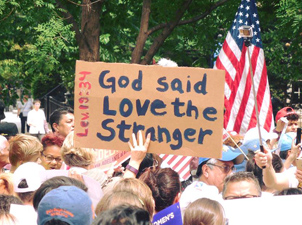
“Public Charge” Then and Now
President Trump’s Anti-Immigrant Policy Remains True to its Origins
Timothy Meagher
May 10, 2018
In 1837, Massachusetts began the first mass immigrant deportation program in the history of the United States. As Hidetaka Hirota’s new history of the Massachusetts deportations, Expelling the Poor, reveals, the program would last for more than a half a century and would deport over 50,000 immigrants. The deportees were not undocumented (there were few restrictions on immigrants coming into the country then).
Massachusetts law, however, permitted state officials to board ships and send some immigrants home because they seemed likely to seek public assistance or welfare, becoming a “Public Charge.” Later amendments to the law sent state officials on regular inspections of poorhouses or asylums searching for immigrants already living in the United States who had become public charges and could then be deported to “home” countries that some had not seen in decades. The state even deported immigrants like Hugh Carroll, who had become American citizens. Many of the deportees were mothers, abandoned or widowed, often with young children, who could not find work that allowed them to earn a living and raise their kids at the same time. They had no alternative but the poorhouse. All of these immigrants, as a contemporary newspaper pointed out, were evicted from Massachusetts “for the crime of being poor.”
Advocates of the law insisted that the deportations were necessary; foreign paupers were flooding the state, they argued, becoming “leeches upon our taxpayers.” Of course, there were other, powerful motives behind the law beyond a concern for the public purse.
Over the law’s course of fifty years the vast majority of the deportees were Irish Catholics; that was no coincidence. The deportation program began in the 1830s, when Irish immigrant numbers in Massachusetts were rising and native residents of Massachusetts responded with frenzied assaults on Irish Catholic neighborhoods and institutions like the Ursuline Convent in nearby Charlestown. The deportations reached their high point in the mid-1850s when the virulently anti- Catholic and anti- immigrant Know Nothings attacked Catholic Churches and took control of the state government, strengthening the deportation law, and fiddling with immigrant voting rights. To supporters and administrators of the law, Irish Catholic and pauper was a distinction without a difference: Irish Catholics were by their nature paupers or inevitably on their way to becoming ones. “Celtic pauperism is our stone of stumbling,” a prominent nativist leader stated, the Irish Catholic “ will not work when he can exist by begging.”
Now, the Trump administration has proposed expanding the federal criteria for determining whether a documented immigrant living in the United States is a “public charge.” The old criteria included receiving cash welfare payments, but the new rule would include participation of an immigrant or their dependent children– including U.S. citizens– in “almost any form of welfare or public benefit,” including: the Earned Income Tax Credit, state Children’s Health Insurance Programs (CHIP), or federal health insurance subsidies. If defined as a public charge under this new rule, legal immigrants could be denied green cards or extension of their work visas and thus be forced to leave the country.
The Trump administration, of course, claims that it is only trying to “protect the American taxpayer,” just as Massachusetts’ old Know Nothings did a century and a half ago. Yet, as the Washington Post reported, changes in the definition of a public charge are frankly designed to “reduce the number of foreigners living in the United States,” which, of course, is also what the Know Nothings in Nineteenth century Massachusetts were trying to do. Only the names, the homelands and often the races of the deportees are different. The same anti-immigrant sentiment has no place in our federal policies today.
During the Civil War, Peter Welsh, color sergeant in the 28th Massachusetts, a part of the Irish Brigade, died of wounds inflicted in the battle of Spotsylvania. Earlier in the war, he had written home to his wife explaining why he was fighting for the Union: what, he asked, would have been the fate today of “hundreds of thousands of the sons and daughters of poor old oppressed Erin if they had not a free land like this to emigrate to, famine and hunger staring them in the face.”







